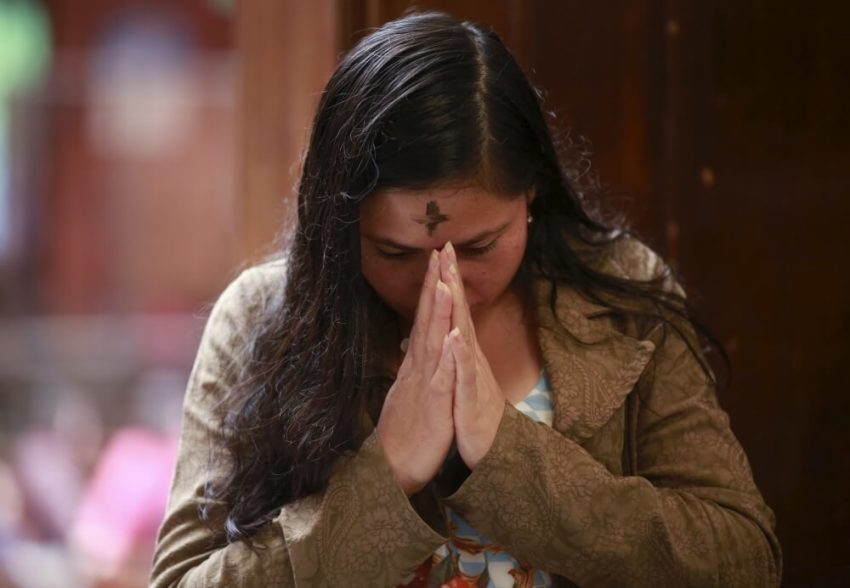'Ashes to Go': Ash Wednesday observances altered as COVID-19, snow create difficulties

Amid ongoing concerns about the COVID-19 pandemic and a major snowstorm, churches throughout the United States and overseas have made changes in how they are distributing ashes on Ash Wednesday, the first day of Lent.
Though the idea of receiving the Lenten rite on the go is not new and has been practiced in previous years, it is being done in various fashions this year as churches once again had to consider ways to distribute ashes in a safe manner that does not risk the spread of coronavirus.
The imposition of ashes on the forehead in the sign of a cross is practiced in the Catholic and liturgical Protestant churches.
As the ashes are imposed, they are often accompanied by the phrase, spoken by a pastor or priest: "Remember that you are dust and to dust you shall return." The phrase is taken from God's words to Adam in Genesis 3:19.
Ash Wednesday sets in motion the penitential season of Lent, which lasts for 40 days leading up to Easter.
Nationwide, pastors have been brainstorming how to perform the ritual while abiding by social-distancing guidelines.
"Across the country, pastors have been sharing how to do this safely," said Rev. John Nelson of Gethsemane Lutheran Church in Hopkins, approximately 10 miles west of Minneapolis, in a Tuesday interview with The Minneapolis Star-Tribune.
"It's everything from having a few people come into church at scheduled times to mailing out ashes to people in their homes," he said, adding that the administering of ashes is "a very personal religious ritual that is difficult to do virtually."
Another Lutheran congregation, Gustavus Adolphus in St. Paul, is planning a drive-in worship service in the parking lot. Masked pastors will minister the rite from car to car, using a long cotton swab, to be thrown away after every use. Ashes will be applied either on the forehead or the tops of hands, based on the recipient's preferences.
"This at least gives us an opportunity to be together," said senior pastor John Hierlinger, "albeit in cars in our parking lot."
Churches in central New York are also administering drive-thru ashes or supplying them for people to take home.
Alan Rudnick, the pastor of DeWitt Community Church, said it is important to maintain the tradition even though the process is different this year.
“When we have drive-thru communion, or we have drive-thru events like this at our church, you should just see people’s faces light up, [and] the smiles on their faces. We’re able to pray with people. They can stay in their cars. They feel safe. We feel safe and try to keep a sense of continuity for our faith,” he told Syracuse-based outlet Localsyr.com Wednesday.
For the second year in a row, the Episcopal Diocese of Washington is offering "ashes to go" at various locations throughout the metropolitan area.
In Ireland, where current coronavirus restrictions require all church services to be held virtually, a Catholic priest from County Donegal, Father Brian Brady, made batches of "takeaway ashes" for parishioners to administer from home.
According to reports, the priest teamed up with a shop in the town of Clonmany to offer the ashes in sauce containers.
"It's a new experience formed to have people wanting to talk to me," Brady told BBC Radio Ulster.
"There's been a lot of attention, and people want more ashes but can't get them."
In some parts of the world, the cornavirus is not the only thing making Ash Wednesday difficult.
As an uncharacteristic winter storm in Texas that has caused millions to lose power, San Antonio Archbishop Gustavo Garcia-Siller granted Catholics a dispensation from fasting on Ash Wednesday. According to an announcement, he will allow ashes to be given at the end of the masses this weekend if churchgoers cannot receive them on Wednesday.
“Many churches are canceling or reducing the number of liturgies they are offering out of concern for the safety of their parishioners in these dangerous conditions,” the announcement reads. “Many facilities are also without power, and roads are still closed in some areas. Driving conditions remain difficult with ice and snow.”



























